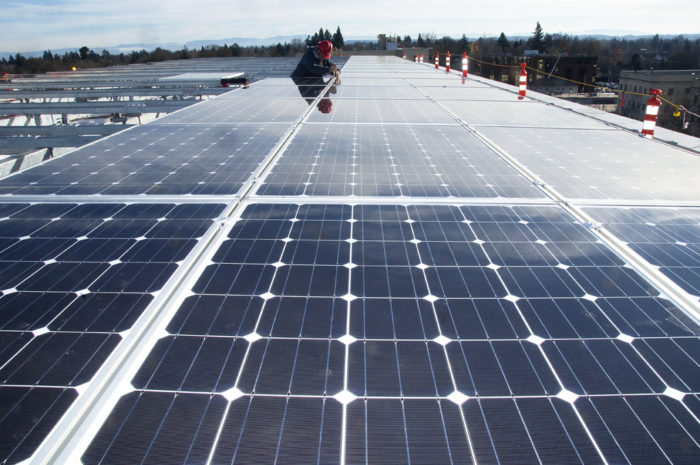
Image Credit: Oregon Department of Transportation / CC BY 2.0 / Flickr
The news was not entirely unexpected, but last week’s ruling that U.S. solar manufacturers have been harmed by cheap imports has opened the door to new tariffs and prompted warnings that job losses and higher prices will follow.
In voting unanimously to support a petition from Suniva and SolarWorld Americas, the International Trade Commission (ITC) has started a process that will place a final decision on new tariffs and minimum module prices in the hands of President Donald Trump. The next step is a hearing on October 3 in which the ITC weighs potential remedies. There is a November 13 deadline to send a recommendation to Trump. The president will have 60 days to accept or amend the ITC’s recommendations.
In the meantime, an industry trade group is warning of the serious consequences that could result from the “deeply flawed” trade case, brought by the two bankrupt companies under a seldom used provision of U.S. trade law.
In a written statement following the September 22 decision, Abigail Ross Hopper, the president and CEO of the Solar Energy Industries Association, said that Suniva and SolarWorld, both of which have non-U.S. owners, had only themselves to blame for their business problems.
“The ITC’s decision is disappointing for nearly 9,000 U.S. solar companies and the 260,000 Americans they employ,” she said. “Foreign-owned companies that brought business failures on themselves are attempting to exploit American trade laws to gain a bailout for their bad investments.” The SEIA has argued that as many as 88,000 U.S. jobs could be at stake.
Suniva, on the other hand, said the question was whether the U.S. would continue to have the capability of manufacturing solar panels.
“We brought this action because the U.S. solar manufacturing industry finds itself at the precipice of extinction at the hands of foreign market overcapacity,” the Georgia-based company said in a statement. “It will be in President Trump’s hands to decide whether America will continue to have the capability to manufacture this energy source.”
More wrangling to follow
The SEIA hopes it can present a convincing case to the ITC and the president that new tariffs on solar cells and modules are not in the country’s best interests.
“We expect to be front and center in the ITC remedy process, and in the administration’s consideration of this deeply flawed case,” Hopper’s statement said.
The New York Times talked with several analysts who said that tariffs would revive solar module manufacturing in the U.S. and prompt foreign producers to open U.S. factories or enlarge factories they have here.
But reaction has been mostly negative. Price spikes in anticipation of the ITC vote are already having an impact on planned solar projects, and new tariffs could threaten billions of dollars in solar investments in the Southeast alone, according to a report from Greentech Media. Stephen Smith, the executive director of the Southern Alliance for Clean Energy, said that utilities in the region are planning to add more than 4,000 megawatts of solar, an investment of more than $4 billion.
“All those jobs, property values, and clean energy opportunities are now at serious risk given today’s decision,” he told Greentech Media.
A number of interest groups have lined up against the tariffs, including a bipartisan group of U.S. senators, including Republican senators from Georgia and Kansas. The American Legislative Exchange Council, a behind-the-scenes group promoting conservative policy among state lawmakers, the National Taxpayers Union, and the conservative Heritage Foundation also are among the critics.
The key decision will be made by a president whose pledge to put “America First” and restore the coal industry to a position of prominence, and that has some industry insiders predicting that new tariffs are all but a sure thing.
“[Trump] could easily reward his buddies in the coal industry who would really like to see high-priced solar panels competing with coal for space on the grid,” Clark Packard, a policy analyst and trade lawyer with the conservative think tank R Street Institute, which opposes tariffs, told Politico. “He may just want to stick it to people — your coastal elites who never would have voted for him who are more likely to use solar panels. He’s looking for any circumstance to impose tariffs, it doesn’t seem he cares what they are.”
Weekly Newsletter
Get building science and energy efficiency advice, plus special offers, in your inbox.














0 Comments
Log in or create an account to post a comment.
Sign up Log in